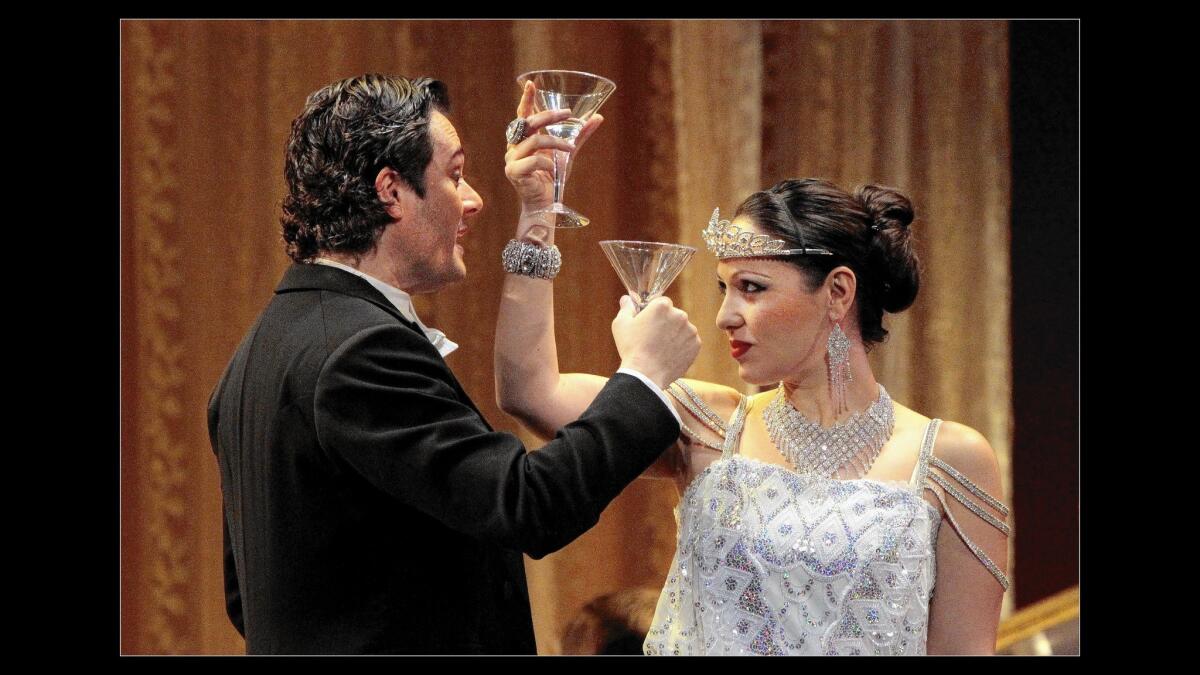Review: L.A. Opera opens season with flat, clumsy ‘La Traviata’

Los Angeles Opera is almost back.
Not that it has gone anywhere. But after having been one of the country’s most progressive companies last decade, it had to put much of its imagination on hold in its past four conventional seasons. There was an extravagant “Ring” to pay off. However worthwhile an investment in the company’s and our city’s artistic growth, the expense of Wagner’s four-opera cycle stalled further growth for a while.
Finally this season (which began Saturday night at the Dorothy Chandler Pavilion) promises, along with traditional fare, a return to groundbreakingly original productions, the long-awaited major-company revival of John Corigliano’s “The Ghosts of Versailles” and such way-out offerings as “Hercules vs. Vampires,” a mash-up of opera and Mario Bava’s camp cinematic sex and gore — can’t wait for that one.
The waiting, however, is not quite over. L.A. Opera is apparently taking no chances in taking chances. With a prudent effort to put a little extra money in the bank before beginning new adventures, the company has begun season by remounting an old production of Verdi’s most popular opera, “La Traviata.” The draw is Plácido Domingo singing the baritone role of Giorgio Germont.
It’s worked. Advance box office was good enough to add an extra performance Friday. The company also hopes to drum up further interest, as well as simply give beachgoers a good time, by simulcasting Wednesday’s “Traviata” performance live on the Santa Monica pier for free.
Over the past 15 years we’ve had two productions of “Traviata” at L.A. Opera, both by Marta Domingo. One retains the original 19th-century setting of the consumptive courtesan, Violetta, with a heart of gold. The other, the one the company is now remounting, makes Violetta an American flapper in the 1920s.
As a mom-and-pop “Traviata” team, the Domingos bring an unparalleled wealth of experience. In his long career as a tenor, Plácido Domingo probably sang the tenor role of Violetta’s lover, Alfredo, probably more times than he can count. Among that number were both a steamy film of the opera and a recording conducted by Carlos Kleiber that brought out exceptional refinement and sophistication from the tenor, then in his exceptional prime.
Domingo has also conducted “Traviata,” including his wife’s other traditional production at L.A. Opera in 2001. Now a baritone, he sang Germont, Alfredo’s father, for the first time at the Met last season. As if that triple crown weren’t enough, Plácido Domingo heads L.A. Opera, which means he has a big — and final — say in casting.
To make the current offering at L.A. Opera all the more Domingo-centric, the director is also credited as production designer, which means sets and costumes are Marta Domingo’s. Thus, there is no one else to blame for a flat, clumsy show.
Because it’s not new, there is little need to belabor the set. When the shiny old car drives through, it looks like a tacky display in the Petersen Automotive Museum. The opera ends with Violetta dying on a swanky bed surrounded by the night sky. The lighting, like much else, is careless: Spot lights project shadows of the singers against the stars.
The singers are saddled with gestures that telegraph emotions to the top balcony. The cast is uneven.
But there is, at least, Nino Machaidze’s Violetta. The Georgian soprano, who has become a regular with the company, began with a wan drinking song, holding back what seemed like a too robust a voice not only for Violetta but also the slightness of her Alfredo, Arturo Chacón-Cruz. The Mexican tenor made little impression all evening.
Machaidze then had to contend with awkwardly undressing as she sang her famous aria, “Sempre Libera,” which translates to always free, but here she was tangled up even in her dressing gown.
But, warmed up, she suddenly had the most beautiful sound I have yet heard from her. Throughout the evening, she may have gotten a little carried away making sudden shifts between dramatic outpouring and floating pianissimos, a tic becoming a predictable shtick. Nor was she able to reveal a convincing sense of character. But she sounded terrific.
When asked in an L.A. Opera podcast about directing her husband, Marta Domingo said he was simply one more member of the cast. He wasn’t. He was Plácido Domingo, the world’s most experienced opera singer, a stage animal, a presence. Not surprisingly, he was the one person on stage who looked like he belonged.
His voice lacked warmth and body, sounding as though he has not fully recovered from a respiratory infection last month. Yet through sheer professionalism he used gruffness to his advantage. As Alfredo’s father, who breaks up the romance with Violetta and accelerates her death thanks to his moral conventionalism, Domingo was a Germont hoarse perhaps from knowing all along he is wrong but unable to help himself, or properly express himself.
Of the smaller parts Peabody Southwell’s florid Flora, Violetta’s friend, stood out. An excellent chorus and expert control from L.A. Opera music director James Conlon supplied essential theatrical discipline.
Stepping into all this was an unapologetic nonprofessional. The national anthem was conducted (firmly on the beat) by “Maestro” Zev Yaroslavsky, the outgoing county supervisor and failed oboist, who has generated indispensable county support for the company and who is underwriting the simulcast at the beach with his discretionary funds.
Ever the politician, Yaroslavsky was then spotted in the second-act party scene, gambling and carousing. To cheers from the house, he was honored on stage during the curtain calls.
Stay tuned. Once the flappers flee, the season looks like a winner.
Twitter: @markswed
More to Read
The biggest entertainment stories
Get our big stories about Hollywood, film, television, music, arts, culture and more right in your inbox as soon as they publish.
You may occasionally receive promotional content from the Los Angeles Times.











